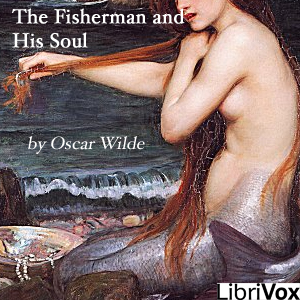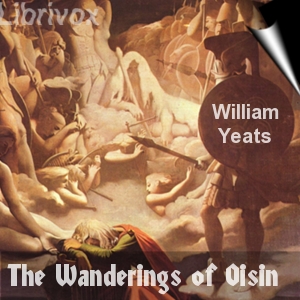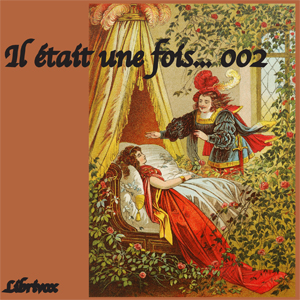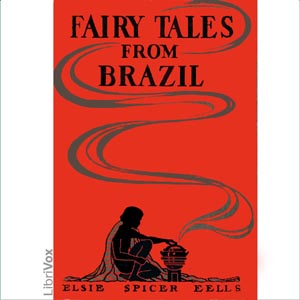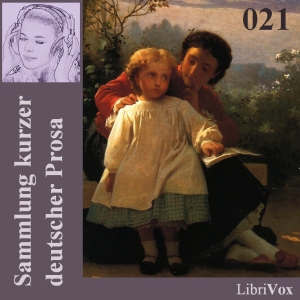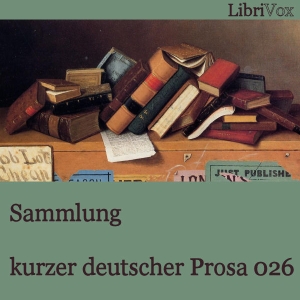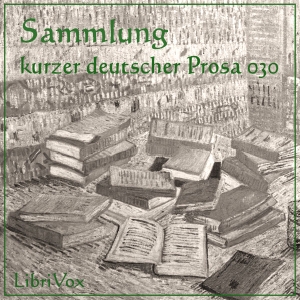”The Fisherman and his Soul” is a fairy tale first published in November of 1891 in Wilde’s “A House of Pomegranates”. It tells of a fisherman who nets and falls in love with a mermaid. But to be with her he must shed his soul, which goes off to have adventures of its own. Will forbidden love endure? -- This reader has also recorded the three other tales in “A House of Pomegranates” which can be found in the LibriVox Short Story Collections, volumes 37, 38, and 39. (Summary by Gregg Margarite)
2 episodes
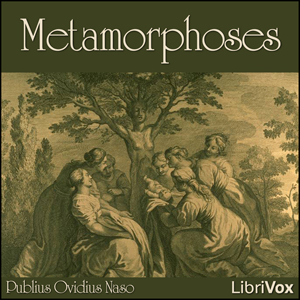
The Metamorphoses of Ovid is probably one of the best known, certainly one of the most influential works of the Ancient world. It consists of a narrative poem in fifteen books that describes the creation and history of the world through mythological tales, starting with a cosmogony and finishing with the deification of Julius Caesar. Published around 8 AD, the Metamorphoses are a source, sometimes the only source, for many of the most famous ancient myths, such as the stories of Daedalus and Icarus, Arachne or Narcisus. Ovid works his way through his subject matter often in an apparently arbitrary fashion; however, the connection between all the seemingly unconnected stories is that all of them talk about transformation. Change as the only permanent aspect of nature is the certainty that underlies the work of Ovid, who jumps from one transformation tale to another, sometimes retelling what had come to be seen as central events in the world of Greek myths and sometimes straying in odd directions. The poem is often called a mock-epic. It is written in dactylic hexameter, the form of the great heroic and nationalistic epic poems, both those of the ancient tradition (the Iliad and Odyssey) and of Ovid's own day (the Aeneid). It begins with the ritual "invocation of the muse," and makes use of traditional epithets and circumlocutions. But instead of following and extolling the deeds of a human hero, it leaps from story to story sometimes in very cunning ways, and, because of the clever ways in which it connects the stories, the Metamorphoses were once called the "Thousand and One Nights of the Ancient World". (Summary adapted from Wikipedia by Leni)
45 episodes
The Ingoldsby Legends are a collection of myths, legends, ghost stories and poetry supposedly written by Thomas Ingoldsby of Tappington Manor, actually a pen-name of Richard Harris Barham.
The legends were first printed in 1837 as a regular series in Bentley's Miscellany and later in New Monthly Magazine. The legends were illustrated by John Leech and George Cruikshank. They proved immensely popular and were compiled into books published in 1840, 1842 and 1847 by Richard Bentley. They remained popular through the Victorian era but have since fallen out of fame. An omnibus edition appeared in 1879: The Ingoldsby Legends; or Mirth and marvels. (Summary from Wikipedia)
28 episodes

Tristam & Iseult is a narrative poem containing strong romantic and tragic themes: and was first published in 1852 by Matthew Arnold. This poem draws upon the Tristam and Iseult legends: which were popular with contemporary readers.The poem opens with Tristam upon his deathbed. The monologue of the dying man is shot through with sharp pangs of regret: centering upon his induced passion for Iseult of Ireland - inflamed by his unwittingly imbibing an irresistible love-potion.Before his decease, Tristram's lawful wife - Iseult of Ireland - arrives in time to share his deathbed. Iseult of Brittany graciously accedes to their request to be buried near each other - in a splendidly-constructed mausoleum back in King Mark's Tyntagel (sic.) in Cornwall.Iseult of Brittany survives to raise Tristram's children in isolation. She forgives Tristam his adultery, and with delightful pathos is thankful for the short years of happiness that she spent espoused to one of King Arthur's most renowned knights. (Summary by Godsend)
4 episodes
Andrew Lang's Fairy Books or Andrew Lang's "Coloured" Fairy Books constitute a twelve-book series of fairy tale collections. Although Andrew Lang did not collect the stories himself from the oral tradition, the extent of his sources, who had collected them originally (with the notable exception of Madame d'Aulnoy), made them an immensely influential collection, especially as he used foreign-language sources, giving many of these tales their first appearance in English. As acknowledged in the prefaces, although Lang himself made most of the selections, his wife and other translators did a large portion of the translating and telling of the actual stories.Many of the books were illustrated by Henry J. Ford. Lancelot Speed, and G. P. Jacomb Hood also contributed some illustrations. (Summary by Wikipedia)
34 episodes
Gotthold Ephraim Lessing war der wichtigste deutsche Dichter der deutschen Aufklärung. Fabeln und Erzählungen, veröffentlicht 1771. Fabeln. Drei Bücher, veröffentlicht 1759. (Zusammenfassung von Wikipedia)Da im Text (1) einige Seiten der "Fabeln. Drei Bücher, veröffentlicht 1759." Mängel aufwiesen, wurden diese Seiten von dem Text (2) vorgelesen.
5 episodes
All people in the world tell nursery tales to their children, and the stories are apt to be like each other everywhere. A child who has read the Blue and Red and Yellow Fairy Books will find some old friends with new faces in the Pink Fairy Book. Courage, youth, beauty, kindness, have many trials, but they always win the battle; while witches, giants, unfriendly cruel people, are on the losing hand. So it ought to be, and so, on the whole, it is and will be; and that is all the moral of fairy tales. We cannot all be young, alas! and pretty, and strong; but nothing prevents us from being kind, and no kind man, woman, or beast or bird, ever comes to anything but good in these oldest fables of the world. (Summary of the Author's Preface by Elliott Miller)
42 episodes

“Who ever lov’d, that lov’d not at first sight?”
The wonder-decade of the English drama was suddenly interrupted in 1592, when serious plague broke out in London, forcing the closure of the theatres. Leading playwrights took to penning languorously erotic poetry to make ends meet: so we have Venus and Adonis, The Rape of Lucrece - and Marlowe’s blazing masterpiece, Hero and Leander.
Marlowe’s poem became more notorious than either of Shakespeare’s, due not only to its homophile provocations but also to the scandal attaching to every aspect of Marlowe’s brief life, violently ended in a mysterious brawl, leaving the poem in an unfinished state.
The edition read here includes the wonderful continuation by George Chapman, a versatile playwright: tragedian as well as author of Jonsonian metropolitan comedies: in short, an all-round literary craftsman, whose Homer translation was famously admired by Keats. Chapman excels in extended allegory, but also in pithiest epigram –
“Love is a golden bubble, full of dreams,
That waking breaks, and fills us with extremes.”
All these playwrights come from the generation of grammar-school alumni raised on the secular curriculum of Latin poetry: above all, Ovid – the source of the story of Hero and Leander, and their “love-death” in the Hellespont.
(Summary by Martin Geeson)
16 episodes

This version of the book is done as a Dramatic Reading with various people speaking each characters part.
When the King of Barodia receives a pair of seven-league boots as a birthday present, his habit of flying over the King of Euralia's castle during breakfast provokes a series of incidents which escalate into war. While the King of Euralia is away, his daughter Hyacinth tries to rule in his stead and counter the machiavellian ambitions of the king's favourite, the Countess Belvane. Ostensibly a typical fairytale, it tells the story of the war between the kingdoms of Euralia and Barodia and the political shenanigans which take place in Euralia in the king's absence. The book introduces us to a princess who is far from helpless; a prince who, whilst handsome, is also pompous and vain; an enchantment which is almost entirely humorous; a villain who is not entirely villainous and receives no real comeuppance; a good king who isn't always good; an evil king who isn't always evil, and so on. The result is a book which children may not enjoy as much as adults. The book was written by Milne partly for his wife, upon whom the character of the Countess Belvane was partially based. (Summary from Wikipedia)
Cast:Narration: Bob NeufeldKing Merriwig: Mark F. SmithPrincess Hyacinth: Karen SavageCountess Belvane: Catharine EastmanPrince Udo: Peter EastmanDuke Coronel: Glenn SimonsenWiggs: Arielle LipshawWoggs: Karen SavageKing of Barodia: Roger MelinChancellor of Barodia: Robert KeiperChancellor of Euralia: Denny SayersFairy: Neeru IyerOld Woman: Catharine EastmanAttendant: Arielle LipshawCarlo, Men of Euralia, Captain of Archers, Flunkey: David LawrenceLookout, Cautious voice, Messenger, Wizard, Sentry: Barry EadsAudio edited by: Barry EadsProof Listening by: Joy Easton and Arielle Lipshaw
22 episodes
Librivox’s Children’s Short Works Collection 005: a collection of 15 short works for children in the public domain read by a variety of Librivox members.
15 episodes

Nausicaa, daughter of Alcinous, king of the Phaeacians, is asleep when Athena comes to her to suggest that she go down to the river the next morning, with her attendants. So the next morning Nausicaa persuades her parents to lend her a wagon to take clothes down to the river for washing.The party goes down to the washing pool. Nausicaa is about to fold and put away the clothing when the ship-wrecked Odysseus, who is asleep nearby, wakes up. He wonders where he is.Grabbing an olive branch to hide his modesty, he walks out, caked in salt from the sea and looking terrible. The attendants run away at sight of him, but Nausicaa stands her ground. Odysseus thinks that she might be a goddess, perhaps Artemis. He then tells her that he has been at sea for 20 days, harassed by the god Poseidon, and only came on shore the previous day. He asks Nausicaa for some clothes and if she can tell him how he can get to town.Nausicaa says fate is in Zeus’ hands, but that since Odysseus has reached her country, and she is the daughter of the king, she won't let him go without clothes. She tells her attendants not to be afraid, and to wash the stranger in the river. They give him clothes and an oil flask. He asks them to go away so he can bathe. Odysseus,washed and dressed, looks like a god. Nausicaa says she would like someone like him to be her husband. She tells her attendants to give him food and drink.Then Nausicaa packs up the wagon and tells Odysseus to follow behind, but that, to prevent scandal,he must stop at a grove that is sacred to Athena. He is to wait there until she gets back to the palace. Only then should he come out. He should then enter the city, find the palace, and look for Nausicaa's mother because, if Nausicaa's mother takes to him, all will be well and he will be helped to go on his way home.They set off, and reach the sacred grove that evening.(Summary by hefyd)
6 episodes
"But the Knyght was a little less than perfect, and his horse did not have a metabolism, and his 'castle' was much more mobile - timewise! - than it had any business being!" In 2178, once time travel had become a simple task, it had also been outlawed. Those who chose to ingnore this law were known as time-thieves, and Tom Mallory was among the best of them. When he learns the precise whereabouts of the Holy Grail in 542, he sets out to obtain it with the intention of returning it to the 22nd century to make a handsome profit and to settle on Get-Rich-Quick Street. Off to the year 542 he travels to the castle of Carbonek where the great Knight Sir Launcelot is said to have possession of the Sangraal. (Summary by Roger Melin with quote from Analog Science Fact & Fiction July 1963)
6 episodes
This narrative poem is composed in three parts, and consists of a dialogue between the aged Irish hero Oisín and St. Patrick.
Oison relates his three-hundred year sojourn in the immortal isles of Faerie. In the isles, Oison married the beautiful Sidhe Niamh: together they traveled, feasted, and quested. At last Oison succumbs to the temptation to return and visit the lands of mortal men: inadvertently slipping from his faerie horse, his body touches the ground and instantly puts on the flesh of a decrepit old man.
Oison describes various islands and what he did there: contrasting his noble deeds with the degenerate weakness of the present generation.
(Summary by Godsend)
3 episodes
"The Iliad is an epic poem in dactylic hexameters, traditionally attributed to Homer. Set in the Trojan War, the ten-year siege of Ilium, by a coalition of Greek States, it tells of the battles and events during the weeks of a quarrel between King Agamemnon and the warrior Achilles. Although the story covers only a few weeks in the final year of the war, the Iliad mentions or alludes to many of the Greek legends about the siege" (Summary from Wikipedia)
24 episodes
Hans Christian Andersen, Charles Perrault et les frères Grimm, pour ne nommer que ceux-là : autant d’auteurs d’exception dont les contes et autres histoires ont captivé des générations d’enfants, petits et grands. Dans le second volume de cette collection d’histoires et de contes préférés des enfants, vous découvrirez (ou redécrouvrirez) vingt de ces récits, tantôt très populaires, tantôt moins connus. Ouvrez toutes grandes vos oreilles, et laissez-vous transporter! (Description par ani)
20 episodes
This book, subtitled "How and Why Tales from Brazilian Folk-Lore", is a collection of short stories, most of them etiologial myths from Brazilian Indian Folklore. (Summary by Leni)
19 episodes
Diese Sammlung umfasst 15 deutschsprachige Prosa-Texte verschiedener Genres.
"Die Schrecken der deutschen Sprache" übersetzt von Gregor Blazewski
15 episodes
This is the classic story of William Tell - Swiss patriot and great apple-shooter - as seen through the eyes of English humorist P.G. Wodehouse.
No Swiss were (permanently) injured in the telling of this story; however, results differed for Austrian tyrants.
The original volume also included a humorous poem encapsulating the whole Tell legend, written by John W. Houghton to accompany the sixteen color illustrations. For this audiobook, the stanzas have been collected and read as a single poem. (Introduction by Mark F. Smith)
8 episodes
Librivox’s Children’s Short Works Collection 006: a collection of 11 short works for children in the public domain read by a variety of Librivox members.
11 episodes
This wonderful children’s short story tells all about the youth, manhood and old age of Santa Claus and how he became immortal. (Introduction by jedopi)
22 episodes
The singing mouse tells tales of nature in songs. This book is for those who want to know how the mountains ate up the plains, what the waters said or where the city went. (summary by Nadine)
22 episodes
Voici le neuvième des douze livres des Fables de La Fontaine. Celles-ci datent du XVIIe siècle et sont lues par des lecteurs de divers horizons. This is the ninth book from a collection of 12. The fables were written and first published in the 17th century. They portray humans' behaviour in the society. (Summary by Ezwa)
21 episodes
Diese Sammlung umfasst 15 deutschsprachige Prosa-Texte verschiedener Genres.
15 episodes
Twenty-year-old Mary Alice is bored with her home life and envious of the beautiful, poised, popular girls she sees at parties. At her mother's advice, she reluctantly visits her Godmother in New York, who teaches Mary Alice a little homemade "magic" and the one great Secret that will put her at ease with other people. How can Mary Alice learn to use these gifts to bring happiness into her own life and other lives? Although this charming novelette is subtitled "A True Fairy Story," it reveals that most of the "magic" in life can be found within ourselves. (Introduction by Jan MacGillivray)
6 episodes
Librivox’s Children’s Short Works Collection 007: a collection of 15 short works for children in the public domain read by a variety of Librivox members.
15 episodes
In LibriVox’s Multilingual Fairy Tale Collection, LibriVox volunteers read their favourite public-domain fairy tales. This is a collection of 20 fairy tales in 6 languages recorded by a variety of LibriVox members.
20 episodes
Diese Sammlung umfasst 15 deutschsprachige Prosa-Texte verschiedener Genres.
15 episodes
Kottō contains 20 Japanese stories, collected from different sources and translated by Lafcadio Hearn. The types of stories in this collection are widespread: There are old ghost stories Hearn is best known for (The Legend of Yurei-Daki), his own observations and musings (Pathological), as well as the translation of 'A Woman's Diary', a touching account of the life of the poorer classes in Tokyo, written at the end of the 19th century. (Summary by Availle)
21 episodes
Librivox’s Children’s Short Works Collection 008: a collection of 15 short works for children in the public domain read by a variety of Librivox members.
15 episodes
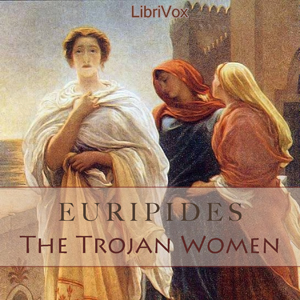
Euripides' play follows the fates of the women of Troy after their city has been sacked, their husbands killed, and as their remaining families are about to be taken away as slaves. However, it begins first with the gods Athena and Poseidon discussing ways to punish the Greek armies because they condoned Ajax the Lesser for dragging Cassandra away from Athena's temple. What follows shows how much the Trojan women have suffered as their grief is compounded when the Greeks dole out additional deaths and divide their shares of women. This translation by Gilbert Murray was published in 1915. (Summary by Wikipedia and Elizabeth Klett)
Cast:Poseidon: Martin GeesonPallas Athena: SweetlilbirdyHecuba: Ruth GoldingChorus leader: RansomChorus 2: KelseighChorus 3: Jessamy GloorChorus 4: LeniChorus 5: Michele McNealChorus 6: Elizabeth KlettTalthybius: Don StirnoCassandra: Lucy PerryAndromache: Elizabeth KlettMenelaus: Bellona TimesHelen: Arielle LipshawNarrator: David LawrenceAudio edited by: Elizabeth Klett
2 episodes
Conan the Cimmerian pursues the beautiful and deadly pirate Valeria after she kills a Stygian only to find himself cornered by a dragon. Apparently this dragon doesn’t know who he’s messing with. The pair then encounters the city of Xuchotl with its warring factions and ancient secrets. Swordplay and sorcery ensue. – Red Nails is Howard’s final Conan story and was published in the July, August, September and October 1936 issues of Weird Tales magazine (Summary by Gregg Margarite)
5 episodes

Once on a time there was a poor husbandman who had so many children that he hadn’t much of either food or clothing to give them. Pretty children they all were, but the prettiest was the youngest daughter, who was so lovely there was no end to her loveliness.So one day, ’twas on a Thursday evening late at the fall of the year, the weather was so wild and rough outside, and it was so cruelly dark, and rain fell and wind blew, till the walls of the cottage shook again. There they all sat round the fire, busy with this thing and that. But just then, all at once something gave three taps on the window-pane. Then the father went out to see what was the matter; and, when he got out of doors, what should he see but a great big White Bear.“Good-evening to you!” said the White Bear.“The same to you!” said the man.“Will you give me your youngest daughter? If you will, I’ll make you as rich as you are now poor,” said the Bear. (from the book)This collection of old Scandinavian fairy tales will enchant you with stories of trolls, enchanted castles, princesses and a White Bear (summary by Nadine)
16 episodes
Diese Sammlung umfasst 15 deutschsprachige Prosa-Texte verschiedener Genres.
"Aase, das kleine Gänsemädchen" und "Aschenbrödel, der mit dem Trollen um die Wette aß" von Peter Christen Asbjørnsen und Jørgen Engebretsen Moe
Die Übersetzung von "Ischtars Höllenfahrt" beruht auf unvollständig erhaltenen Keilschrifttafen. Fehlende Stellen sind in der Aufnahme durch das Wort "Lücke" angezeigt.
15 episodes
Kinder- und Hausmärchen ("Cuentos para la infancia y el hogar"), dos volúmenes publicados en 1812 y 1815. La colección fue ampliada en 1857 y se conoce popularmente como Cuentos de hadas de los hermanos Grimm. Su extraordinaria difusión ha contribuido decisivamente a divulgar cuentos como "Blancanieves", "La Cenicienta", "Hänsel y Gretel" o "Juan sin miedo". (Introducción de Wikipedia)
20 episodes
Sylvie and Bruno Concluded continues the adventures of the many characters in the previous volume Sylvie and Bruno. The fairy-children Sylvie and Bruno are charming whenever they appear, their fairy companions such as the Professor delight in taking ideas to their logical (and humorous) conclusions, and many nonsense songs are sung. Meanwhile, the mortals (comprised of the unnamed narrator, the gracious Lady Muriel and the sententious Arthur) tend to become the vehicles for Carroll's regular sermons on morality and proper Christian values. (Summary by Catharine Eastman)
26 episodes
Librivox’s Children’s Short Works Collection 009: a collection of 15 short works for children in the public domain read by a variety of Librivox members.
13 episodes
The tales in the Grey Fairy Book are derived from many countries — Lithuania, various parts of Africa, Germany, France, Greece, and other regions of the world. They have been translated and adapted by Mrs. Dent, Mrs. Lang, Miss Eleanor Sellar, Miss Blackley, and Miss Hang. 'The Three Sons of Hali' is from the last century 'Cabinet des Fees,' a very large collection. The French author may have had some Oriental original before him in parts; at all events he copied the Eastern method of putting tale within tale, like the Eastern balls of carved ivory. The stories, as usual, illustrate the method of popular fiction. A certain number of incidents are shaken into many varying combinations, like the fragments of coloured glass in the kaleidoscope. Probably the possible combinations, like possible musical combinations, are not unlimited in number, but children may be less sensitive in the matter of fairies than Mr. John Stuart Mill was as regards music. (Summary from the preface)
36 episodes
Diese Sammlung umfasst 15 deutschsprachige Prosa-Texte verschiedener Genres.
"Vom Schweigen" übersetzt von Gustav Landauer (1870-1919)
15 episodes
Robin Hood is a heroic outlaw in English folklore. A highly skilled archer and swordsman, he is known for "robbing from the rich and giving to the poor", assisted by a group of fellow outlaws known as his "Merry Men". Traditionally Robin Hood and his men are depicted wearing Lincoln green clothes. The origin of the legend is claimed by some to have stemmed from actual outlaws, or from ballads or tales of outlaws. (Introduction by Wikipedia)
24 episodes
A survey of the myths and legends concerning lycanthropy from ancient times to the Victorian Era. (Summary by A. Gramour)
16 episodes
Librivox’s Children’s Short Works Collection 010: a collection of 15 short works for children in the public domain read by a variety of Librivox members.
15 episodes
Diese Sammlung umfasst 15 deutschsprachige Prosa-Texte verschiedener Genres.
15 episodes
This collection is dedicated to recordings of short mythical or legendary works which are in the Public Domain. The stories tell of legends, heroes, myths, and ancient lore from many different cultures. - Summary by Lynette Caulkins
12 episodes
The room was all full of twilight; but there they sat, every one of them. I did not count them, but there were ever so many: Aladdin, and Ali Baba, and Fortunatis, and Jack-the-Giant-Killer, and Doctor Faustus, and Bidpai, and Cinderella, and Patient Grizzle, and the Soldier who cheated the Devil, and St. George, and Hans in Luck, who traded and traded his lump of gold until he had only an empty churn to show for it; and there was Sindbad the Sailor, and the Tailor who killed seven flies at a blow, and the Fisherman who fished up the Genie, and the Lad who fiddled for the Jew in the bramble-bush, and the Blacksmith who made Death sit in his apple-tree, and Boots, who always marries the Princess, whether he wants to or not-- a rag-tag lot as ever you saw in your life, gathered from every place, and brought together in Twilight Land.
(Extracted from the first chapter of the book)
19 episodes

Spiegel, das Kätzchen (Untertitel: Ein Märchen) ist eine Novelle des Schweizer Dichters Gottfried Keller. Sie bildet den Schluss des ersten Bandes der 1856 erschienenen Novellensammlung Die Leute von Seldwyla. Der Kater Spiegel schließt, um nicht zu verhungern, mit dem Seldwyler Stadthexenmeister Pineiß einen schlimmen Vertrag: Pineiß, der zu seiner Hexerei den Schmer (das Fett) von Katzen braucht, verpflichtet sich, Spiegel herauszufüttern. Als Gegenleistung muss Spiegel sich schlachten lassen, sobald er fett genug ist. Aber der kluge Kater windet sich heraus, und am Ende ist Pineiß der Angeschmierte: Spiegel vermittelt ihm eine schöne junge Ehefrau mit reicher Mitgift, die sich aber in der Hochzeitsnacht als scheußliche alte Hexe entpuppt; woher, laut Erzähler, das Sprichwort stammen soll: „er hat der Katze den Schmer abgekauft“, wenn jemand einen schlechten Handel gemacht hat. – Vordergründig geht es in der Novelle um die Erklärung der Herkunft eines Sprichwortes. Tatsächlich hat Keller hierin wohl seinem Verleger einen Streich gespielt, denn wie der ausgehungerte Kater dem Hexenmeister sein Leben, so verkaufte der bettelarme Autor dem Verleger seine Lebensgeschichte, den autobiographischen Roman Der grüne Heinrich, noch bevor er ihn geschrieben hatte.Die Novelle gehört zu den bekanntesten Erzählungen Kellers, ist in vielen, oft illustrierten Einzelausgaben verbreitet und wurde musikalisch und literarisch mehrfach adaptiert. (Zusammenfassung von Wikipedia und Karlsson)
4 episodes
This book is an early collection of ten well-known fairy tales. It is thought to have begun the genre of fairy tales.(Summary by A.L. Gramour)
11 episodes
Diese Sammlung umfasst 15 deutschsprachige Prosa-Texte verschiedener Genres.
"Die Blumen der kleinen Ida" übersetzt von Paul Arndt
15 episodes
Master storyteller Padraic Colum's rich, musical voice captures all the magic and majesty of the Norse sagas in his retellings of the adventures of the gods and goddesses who lived in the Northern paradise of Asgard before the dawn of history. Here are the matchless tales of All-Father Odin, who crosses the Rainbow Bridge to walk among men in Midgard and sacrifices his right eye to drink from the Well of Wisdom; of Thor, whose mighty hammer defends Asgard; of Loki, whose mischievous cunning leads him to treachery against the gods; of giants, dragons, dwarfs and Valkyries; and of the terrible last battle that destroyed their world. (Summary from Project Gutenberg)
27 episodes
Ein nach der Natur entworfenes Märchen.
Eines Tages findet das gartenbegeisterte Fräulein Ännchen eine wunderschönen Ring in ihrem Mohrrübenfeld. Nachdem sie ihn übergestreift hat, kann sie ihn nicht mehr von ihrem Finger bringen und ihr in den geheimen Wissenschaften bewanderter Vater Dapsul von Zabelthau eröffnet ihr, dass sie dadurch die Braut eines gewissen Porphyrio von Ockerodastes geworden ist. Ihr Vater ist begeistert von dieser Verbindung, doch Ännchen fleht ihren an der Universität weilenden Verlobten Amandus von Nebelstern um Hilfe und Rettung an. Als sich herausstellt, dass der vermeintliche Porphyrio von Ockerodastes niemand anders ist als der Gnomenkönig des Gemüsereichs Daucus Carota, wandelt sich Herrn Dapsuls Begeisterung in Entsetzen, doch Ännchen ist ganz entzückt von der Aussicht, Gemüsekönigin zu werden, auch wenn ihr neuer Verlobter alles andere als gutaussehend ist.
(Zusammenfassung von Hokuspokus)
6 episodes
Voici le dixième des douze livres des Fables de La Fontaine. Celles-ci datent du XVIIe siècle et sont lues par des lecteurs de divers horizons. This is the tenth book from a collection of 12. The fables were written and first published in the 17th century. They portray humans' behaviour in the society. (Summary by Ezwa)
15 episodes
